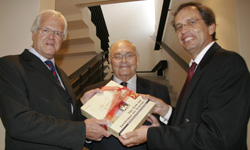 The university’s history book, "From Grey to Gold", is available from UFS Marketing.
The university’s history book, "From Grey to Gold", is available from UFS Marketing.
The book will soon be delivered to persons who have ordered copies of the book. UFS Marketing is in the process of distributing the books.
However, persons are also welcome to collect the book from Rinda Duraan or Ronél Meyer at the offices of UFS Marketing in the Wekkie Saayman Building.
Additional copies in Afrikaans or English are also available from UFS Marketing at R380 per copy. Please contact Ronél Meyer at X2150 or Rinda Duraan at X2143 for inquiries.
A proud 100 years
The history of the University of the Free State is one of faith, hope, struggle and determination. In the course of a century, and from a poor Free State community, the UFS has developed into a strong and mature university. This book, richly illustrated with photographs, tells its fascinating story, including:
-
Its establishment
-
The role of the founding fathers
-
Black pioneers of transformation
-
The establishment and development of academic departments and faculties; student numbers
-
Pioneers and trends in research; academic entrepreneurs
-
Campus issues; campus politics
-
The UFS’s place in socio-political changes
-
Student life: Rag, intervarsity and cheerleaders; sport and Springboks; hostel traditions
-
The admission of black students; anguish about race, language and culture
-
The story of “digs” and hostels, of Tin Town and the “Vlei”, Darkest Africa and the Red Square
-
The development of the campus, of the Tickey and the Banana
-
Of hardships in the founding years, good times and turn-around strategies
-
Community service and regional involvement and a new focus on the African continent.
Some interesting reading:
-
More than 500 pages
-
Hundreds of photographs
-
Appendices on office-bearers; awards and achievements (including national sporting colours)
-
A time-line situating the UFS’s history in the context of the history of the Free State, of South Africa and of the world